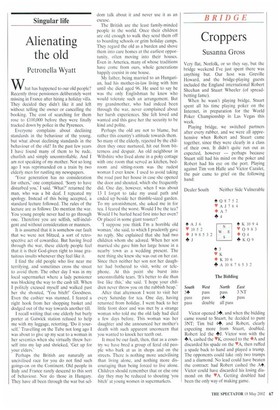Alienating the old
Petronella Wyatt
What has happened to our old people? Recently three pensioners deliberately went missing in France after hiring a holiday villa. They decided they didn't like it and left without telling the owner or cancelling the booking. The cost of searching for them rose to £100,000 before they were finally tracked down by police in the Pyrenees.
Everyone complains about declining standards in the behaviour of the young, but what about declining standards in the behaviour of the old? In the past few years I have found many of them to be rude, churlish and simply uncontrollable. And I am not speaking of my mother. Not so long ago I was reprimanded on a train by two elderly men for rustling my newspapers.
'Your generation has no consideration for others,' one complained. 'Sorry to have disturbed you,' I said. 'What?' returned the man, who was a bit deaf. I repeated my apology. Instead of this being accepted, a standard lecture followed. The rules of the lecture are as follows: Do mention the war. You young people never had to go through one. Therefore you are selfish, self-indulgent and without consideration or manners.
It is assumed that it is somehow our fault that we were not blitzed, a sort of retrospective act of cowardice. But having lived through the war, these elderly people feel that it is their God-given right to issue gratuitous insults whenever they feel like it.
I find the old people who live near me terrifying, and sometimes cross the street to avoid them. The other day I was in my local supermarket where a lady pensioner was blocking the way to the cash till. When I politely excused myself and walked past her she shouted, 'You bitch!' Goodness. Even the cashier was stunned. I feared a right hook from her shopping basket and dodged out of the way towards another till.
I recall writing that one elderly but burly porter at Gatwick station refused to help me with my luggage, retorting, 'Do it yourself.' Travelling on the Tube not long ago I was about to give up my seat to a woman in her seventies when she virtually threw herself into my lap and shrieked, 'Get up for your elders.'
Perhaps the British are naturally an uncivilised race for you do not find such goings-on on the Continent. Old people in Italy and France rarely descend to this sort of behaviour. Nor do those in Hungary. They have all been through the war but sel
dom talk about it and never use it as an excuse.
The British are the least family-minded people in the world. Once their children are old enough to walk they send them off to boarding schools or grim holiday camps. They regard the old as a burden and shove them into care homes at the earliest opportunity, often moving into their houses. Even in America, many of whose traditions have come from ours, whole generations happily coexist in one house.
My father, being married to an Hungarian, had his mother-in-law living with him until she died aged 96. He used to say he was the only Englishman he knew who would tolerate such an arrangement. But my grandmother, who had indeed been through the war, never complained about her harsh experiences. She felt loved and wanted and this gave her the security to be kind and polite.
Perhaps the old are not to blame, but rather this country's attitude towards them. So many of the elderly, rejected by the children they once nurtured, hit out from bitterness and despair. An old neighbour in Wiltshire who lived alone in a poky cottage with one room that served as kitchen, bedroom and sitting-room was the rudest woman I ever knew. I used to avoid taking the road past her house in case she opened the door and shouted, which she frequently did. One day, however, when I was about 13 I forgot to take my usual path and ended up beside her thimble-sized garden. To my astonishment, she asked me in for tea. I feared the worst. Would I be the tea? Would I be hurled head first into her oven? Or placed in some giant toaster?
'I suppose you think I'm a horrible old woman,' she said, to which I prudently gave no reply. She explained that she had two children whom she adored. When her son married she gave him her large house in a nearby town as a wedding present. The next thing she knew she was out on her ear. Since then neither her son nor her daughter had bothered to visit, write or telephone. At this point she burst into uncontrollable tears. 'It's better to die than live like this,' she said. 'I hope your children never throw you on the rubbish heap.'
After that afternoon I went to visit her every Saturday for tea. One day, having returned from holiday, I went back to her little front door and was met by a strange woman who told me the old lady had died a few days before. This woman was her daughter and she announced her mother's death with such apparent unconcern that you wanted to knock her teeth out.
It must be our fault, then, that as a country we have bred a group of feral old people who bark at us in shops and on the streets. There is nothing more uncivilising than living alone, and nothing more discouraging than being forced to live alone. Children should remember that or else one day they may be reduced to shouting 'you bitch' at young women in supermarkets.














































































 Previous page
Previous page